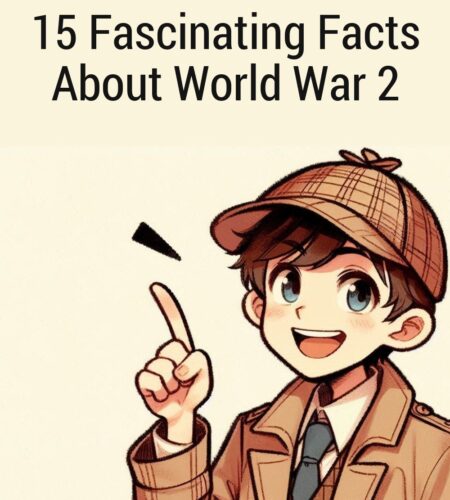Introduction:
World War II was a global conflict that had a profound and lasting impact on the course of history. Spanning from 1939 to 1945, it involved countless nations, millions of soldiers, and resulted in the loss of millions of lives. In this article, we will explore 15 fascinating facts about World War II that shed light on its complexities, achievements, and tragedies.
Fact 1: The Origins of World War II
The origins of World War II can be traced back to the political and economic aftermath of World War I, which left Germany economically devastated and political tensions high. The rise of Adolf Hitler and the Nazi Party in Germany is often cited as a major catalyst for the war, with their aggressive foreign policies and desire for territorial expansion.
Fact 2: Blitzkrieg
Blitzkrieg, meaning “lightning war” in German, was a military strategy employed by the Germans during World War II. It involved the rapid and coordinated use of tanks, aircraft, and infantry to overwhelm and swiftly defeat the enemy. This strategy played a significant role in Germany’s early victories, including the invasion of Poland and the conquest of Western Europe.
Fact 3: The Holocaust
One of the most horrifying and tragic aspects of World War II was the Holocaust, the systematic genocide of six million Jews by the Nazis. Concentration camps such as Auschwitz became synonymous with the unimaginable atrocities committed during this dark time in history.
Fact 4: D-Day Invasion
On June 6, 1944, Allied forces launched the largest amphibious invasion in history, known as D-Day. This operation saw over 156,000 troops from the United States, Britain, and Canada landing on the beaches of Normandy, France, in an effort to liberate Western Europe from German occupation.
Fact 5: The Battle of Stalingrad
The Battle of Stalingrad, fought between Nazi Germany and the Soviet Union, was one of the deadliest battles in history. Lasting from 1942 to 1943, the Soviet victory marked a turning point in the war and inflicted heavy losses on the German army. It is estimated that over two million people, both military and civilian, lost their lives during this brutal battle.
Fact 6: The Manhattan Project
As fears of German nuclear weapons grew, the United States launched the top-secret Manhattan Project. This project aimed to develop atomic bombs, and in 1945, the U.S. dropped two atomic bombs on the Japanese cities of Hiroshima and Nagasaki, leading to Japan’s surrender and the end of World War II.
Fact 7: The Women’s Role
World War II saw a major shift in gender roles, as women played a crucial role in supporting the war effort. Many women took on jobs in factories, worked as nurses, or joined the military. These brave women proved their capabilities and contributed significantly to the war’s outcome.
Fact 8: The Siege of Leningrad
The Siege of Leningrad, lasting from 1941 to 1944, was one of the most brutal and devastating sieges in history. The German blockade resulted in the deaths of approximately one million residents of the city due to starvation, disease, and bombardment. Despite the unimaginable hardships, the people of Leningrad showed incredible resilience and determination.
Fact 9: Code Breakers
Code breaking played a crucial role in World War II, helping to decipher encrypted messages and gain an advantage on the battlefield. One notable example is the British code-breaking team at Bletchley Park, who successfully decrypted the German Enigma machine’s codes, providing vital intelligence to the Allies.
Fact 10: Japanese Internment
Following the attack on Pearl Harbor, the United States implemented a policy of Japanese internment. Over 120,000 Japanese-Americans, many of them U.S. citizens, were forcibly relocated and held in internment camps for the duration of the war. This act of injustice stands as a dark chapter in U.S. history.
Fact 11: The Pacific Theater
While much of the focus of World War II is on the European theater, the war also raged on in the Pacific. The Pacific Theater saw fierce battles between the Allies, led by the United States, and the Japanese Empire. Notable engagements include the Battle of Midway and the island-hopping campaigns that eventually led to Japan’s surrender.
Fact 12: The Home Front
The war had a significant impact on everyday life on the home front. Rationing of food, fuel, and other resources became commonplace as nations redirected their efforts towards the war. Propaganda campaigns were launched to encourage support for the war and boost morale.
Fact 13: The Battle of Britain
In 1940, the Royal Air Force (RAF) defended Britain against relentless German air raids in what became known as the Battle of Britain. The RAF’s successful defense prevented the German Luftwaffe from achieving air superiority and ultimately halted Hitler’s plans for an invasion of Britain.
Fact 14: The Pacific Island Hopping Strategy
To combat Japanese control of strategic Pacific islands, the Allies adopted a “island hopping” strategy. This involved capturing key islands and bypassing others, in order to establish forward bases for further offensives. This strategy played a crucial role in the Allied victory in the Pacific.
Fact 15: The Treaty of Versailles
The Treaty of Versailles, signed in 1919 to officially end World War I, placed full blame on Germany and imposed heavy reparations. The harsh terms of the treaty and the economic hardship imposed on Germany created a fertile ground for the rise of Adolf Hitler and the subsequent outbreak of World War II.
Conclusion
World War II remains a defining moment in history, with its impact felt to this day. From the devastation of the Holocaust to the triumphs of the Allied forces, these 15 facts provide just a glimpse into the complexity, sorrow, and bravery that characterized this global conflict. It is crucial that we remember and learn from these events to ensure that such atrocities are not repeated in the future.
Subscribe to our email newsletter to get the latest posts delivered right to your email.




Comments